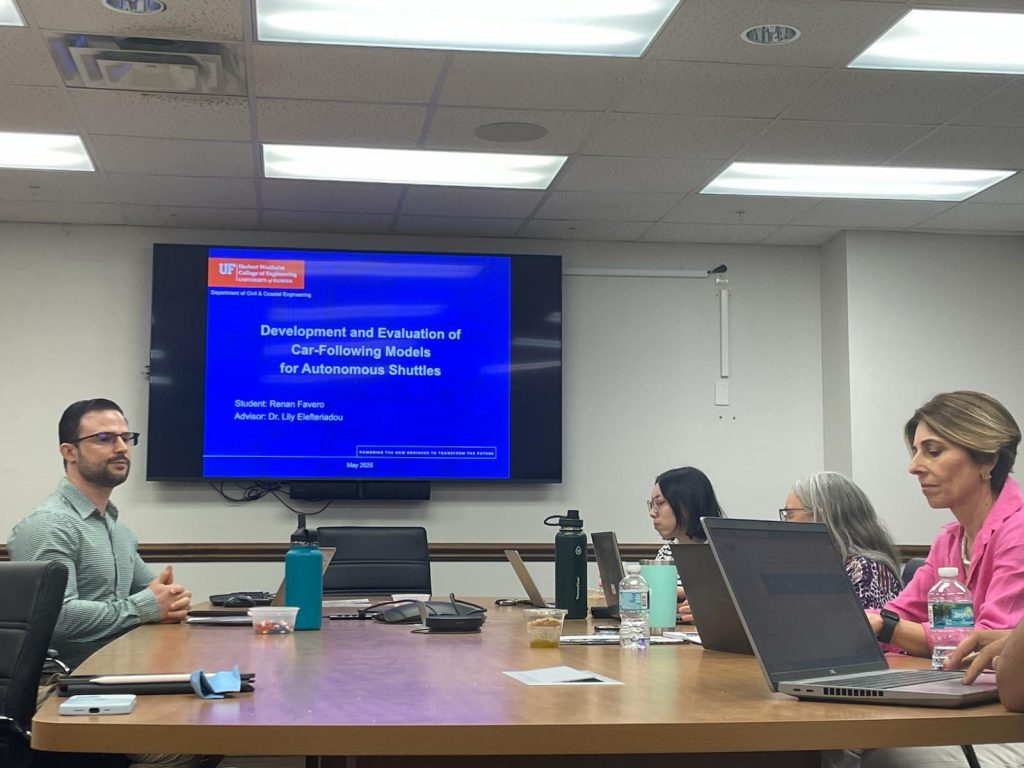By Ines Aviles-Spadoni, M.S., M.A., Research/Communications Coordinator, UFTI

Who would have thought that a microsimulation class would have made such an impact on Renan Favero that he would go on to pursue a career in transportation engineering? It was 2013, and Favero, then an undergraduate student in civil engineering, was attending the Politecnico di Torino, a university in Turin, Italy, as an exchange student.
“I took a microsimulation class and was fascinated by the idea of simulating traffic to improve daily commutes,” he said. “It was when I realized I could use my knowledge to solve real-world problems, have fun simulating different scenarios, and directly impact people’s lives.”
From this point forward, Favero set his sights on a journey that took him from his native Brazil to the University of Florida to pursue a doctoral degree in civil engineering. Focusing on transportation engineering, he has been working under the guidance of his graduate adviser, Lily Elefteriadou, Ph.D., professor and former director of the UFTI.
But for Favero, the doctoral degree journey is not all about the degree itself. He believes it is about serving humanity. Favero reflects on this philosophy.
“It’s about embracing challenges, solving complex problems, and making meaningful contributions through research,” he said. “I’m driven by challenges and the opportunity to create real innovation, and as a consequence, generate findings that can move science and society forward.”
This spring, Favero successfully passed his qualifying examination, launching him into full doctoral candidate mode. He said this very important moment in his career helped him learn how to communicate scientific information in a way that all audiences can understand.
“Summarizing years of work in just a short time is challenging, but it helped me reflect on the purpose and potential impact of my research,” Favero said. “This process helped me reflect on why we do research in the first place—and reminded me that advancing science isn’t just about academic work, but about making a real, positive impact on society.”
As a doctoral candidate at UF’s Engineering School of Sustainable Infrastructure & Environment (ESSIE), Favero’s research focuses on optimizing machine learning based models to simulate the driving behavior of autonomous shuttles, specifically their “car-following” behavior. During his doctoral studies, he has focused on gathering real-world data from these vehicles to find the answer to questions such as how they will perform in traffic alongside conventional vehicles.
“We still don’t fully understand how autonomous shuttles will impact traffic once they’re widely deployed,” Favero said. “They could improve operations, or they might increase delays or cause traffic instabilities.”
Favero hopes the impact of his research will help to provide public agencies and engineers with the tools and insights to plan and safely integrate autonomous shuttles into real-world traffic.
Beyond research and academics, Favero’s passion for transportation has also led him to hold a variety of leadership roles, specifically with UF’s Gator ITE Student Chapter. As a member of the student chapter for the past four years, he has served as marketing coordinator, vice president, and president. For any student at UF, Favero highly recommends involvement with student chapters.
“It’s a great way to develop soft skills, build connections, and learn from your peers,” he said.
This fall, 2025, Favero will graduate, and he is looking forward to the next phase in his life. He says he hasn’t really decided on whether he wants to remain in academia or opt for the private sector. However, he is leaning towards the private sector, where he hopes to sharpen his skills in traffic operations and contribute to projects that enhance road safety, mobility, and accessibility.
